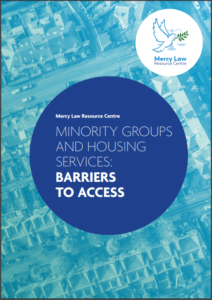
One of MLRC’s solicitor’s Paul Dornan reflects back on the process involved in successfully applying for funding with the Irish Human Rights and Equality Commission (IHREC). Recently, he presented at an IHREC induction webinar to assist others with their successful grant projects.
In 2020, we produced a report on the challenges faced by minority groups seeking to access housing services in Ireland. This research was critical in highlighting the scale of the problems involved and the legal framework that causes barriers in accessing, as well as giving a voice to some of the lived experiences.
MLRC’s work is funded by a wide number of different donors and funds. Occasionally some of our projects are funded by organisations such as IHREC. To help others understand what the grants reporting process is like, we thought we would share Paul’s experiences in his own words.
“Last week, I attended IHREC’s 2021-22 Grant Recipients – Induction webinar. This induction session involved a presentation on the grants programme of 2021-2022, including human rights and equality based research ethics, the role of civil society and grantees experiences. I spoke to MLRC’s experience of commissioning, researching and launching a report funded by IHREC into the barriers faced by minority groups when seeking to access housing services and specifically to:
- How our research was conducted, highlighting in particular that we engaged an external legal contractor to conduct the research and how this process was managed.
- The main findings of the report and the 4 barriers that we identified and how these were legally analysed.
- The importance of the public sector equality and human rights duty to the project. The report identified the barriers as systemic issues and described how the duty can be used as a lever of institutional change.
- The progress on issues highlighted in the report, highlighting in particular the success of the launch event, with participation from NGOs, politicians and other stakeholders. I mentioned the resulting media coverage that we had and significantly, that we had a follow-up meeting with the Minister for Housing and his senior staff along with the Minister of State with responsibility for Community Development and Charities, Joe O’Brien. At the meeting, we were told that many of the report’s recommendations were being given consideration by the Department.
Overall, this report was a fantastic opportunity for us at Mercy Law to expand our advocacy efforts and understand the detail behind inequalities within Ireland’s social housing system. We were able to effectively highlight a number of case studies from our former clients and outline research on the current housing law in Ireland. We would recommend any organisation consider applying for an IHREC grant in the future if they believe they have an eligible project.”

For more examples of successful IHREC grants please see here.
